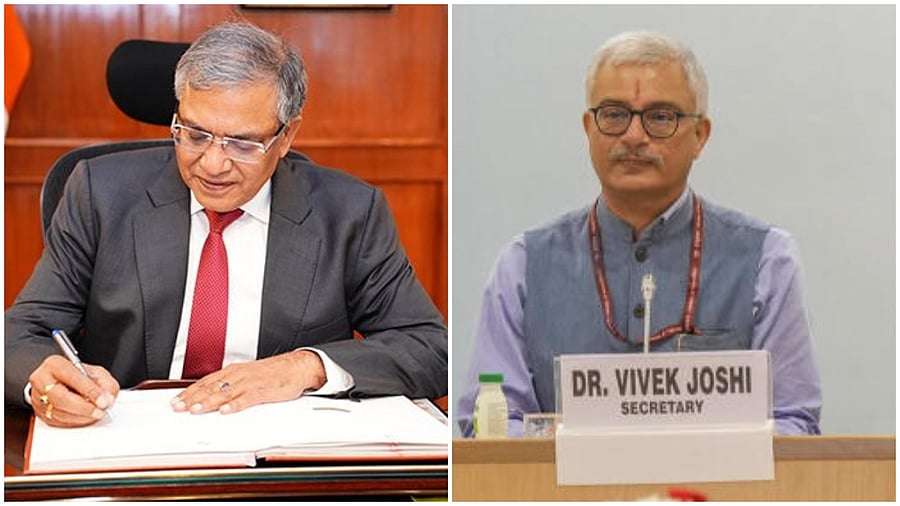
(From L to R) Gyanesh Kumar; Vivek Joshi
Credit: Special Arrangement, PTI Image
New Delhi: Gyanesh Kumar was on Monday night appointed next Chief Election Commissioner, hours after Leader of Opposition in Lok Sabha Rahul Gandhi raised objections over the selection process at a time the Supreme Court is set to hear a petition against the law and mechanism for appointment in two days.
Haryana Chief Secretary Vivek Joshi, a 1989-batch IAS officer, was appointed Election Commissioner following the elevation of Kumar. Sukhbir Singh Sandhu, who was appointed along with Kumar as Election Commissioner, will continue in his position. Incumbent Rajiv Kuma demits office on Tuesday.
An IIT-Kanpur alumni who was appointed Election Commissioner on March 14 last year, Kumar played a key role in setting up the Shri Ram Janmabhoomi Theertha Kshetra Trust when he was in the Ministry of Home Affairs as Additional Secretary. He also headed the Jammu and Kashmir division in 2019 when Article 370 was revoked.
President Droupadi Murmu cleared Kumar's name after the Selection Committee headed by Prime Minister Narendra Modi recommended the former Kerala cadre IAS officer's name. Rahul, the third member of the committee, was not part of the selection process, as he left the meeting after raising his objections and demanded a postponement of the meeting.
As the three-member panel’s meeting started and just as the discussion on names was about to commence, sources said Rahul intervened and raised his reservations about the procedure adopted. He told the Prime Minister and the Home Minister that there are some fundamental issues regarding the constitution of the committee, as it is dominated by the government.
He referred to the Supreme Court judgment which outlined the Prime Minister, Leader of Opposition and Chief Justice of India as members of the Selection Committee and claimed that the government passed a law to override it by passing a law in Parliament when a large number of Opposition MPs were under suspension, sources said.
As he submitted his note on the issue, sources said he was told that it would be considered as his dissent note and included in official documents. Rahul did not participate in further proceedings of the committee though Congress sources refused to call it a walkout.
The process to appoint a new CEC has started, even as the SC has fixed February 19 for hearing a petition on the validity of The Chief Election Commissioner and the Other Election Commissioners (Appointment, Conditions of Office, Terms of Office) Act, 2023, which omits the CJI from the selection panel.
Gyanesh Kumar and Sukhbir Singh Sandhu are the two other members in the EC and the former is the senior most after Rajiv Kumar.
While there is no official word on what Rahul conveyed in the meeting held at 5:30 PM, Congress held a press conference with senior leaders Ajay Maken and Abhishek Manu Singhvi asking why the government could not have waited for another 48 hours to hold the meeting when the SC is seized of the matter.
By removing the Chief Justice of India from the Selection Committee, he said, the government has made it clear it "wants control and not to preserve the credibility" of the Election Commission.
"It was just a matter of 48 hours and the government should have approached the apex court for an early hearing of the petition. It is our suggestion that the Central government adjourn this meeting until after the hearing AND instruct its counsels to appear and assist the court so that the hearing may be an effective one. Only then, can a decision be taken in earnest," Singhvi said.
He said the Congress cannot ignore that the Selection Committee, which is “partisan and non-neutral mechanism”, is in “clear and direct violation” of the Supreme Court’s Judgement of 2 March, 2023, which had the Prime Minister, the Leader of Opposition in Lok Sabha and the CJI as members of the selection panel.
The union government "wants to ensure the creation of a Committee that will only allow the appointment of such candidates that will never threaten its (government's existence. Why else would the Supreme Court’s direction to have the CJI on the Committee be dropped? No answer has been given, either within Parliament or outside," Singhvi said.
This is the first time that a CEC is selected under the provisions of the new law. Before this, Gyanesh Kumar and Sandhu had been selected under the new law, which came into effect following a Supreme Court judgement mandating a procedure for appointment.
While the SC said the government could bring in a law to regulate the mechanism of appointment, the government omitted CJI from the panel and included a Union Minister of Prime Minister's choice.
Earlier, Election Commissioners and Chief Election Commissioners (CECs) were appointed by the President on the recommendations of the government.
